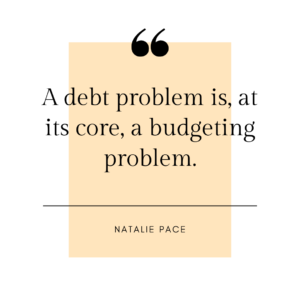One of the biggest milestones for many is graduating college and/or starting their first job. And while the world gets more and more educated, many people can not afford college. Hence the student loan debt problem. At the end of 2020, the Federal Reserve reported that in the United States, student loan debt exceeded $1.7 trillion.
You read that right… TRILLION! In my blog post Why You Should Gift Financial Literacy (Yes It’s a Thing!), I wrote about the importance of financial literacy and how it could be an important tool for leveling the playing field and preparing the next generation to withstand an uncertain future. To try to help fix the financial literacy problem, some universities and colleges started offering classes or programs to their students that focus on financial success. I think this is amazing because when I graduated college, I thought I was prepared to take on the world. But I was terribly lacking fundamental knowledge about personal finance.
If I understood the power of investing and the importance of setting up IRAs, I would probably be sitting on over a million bucks in my retirement accounts and traveling the world like I always wanted because I could afford it. I think it is important that we impart the financial know-how to the young adults in our life to help them put their right financial foot forward. And while lawmakers continually debate whether to forgive some or all student loan debt, as a society, we should equip our recent graduates with the tools for financial success.
Considering what I now know in my late 30s, and looking back at what I didn’t in my early 20s, I thought long and hard about how could I gift financial literacy to my sons in the future. In essence, what would I gift my young self just entering the workforce? So in that vein, below are my recommendations for financial literacy gifts for the new college graduate! I would love to hear if you have gifted any of the below or have other ideas in the comment box below.
PLEASE NOTE: While I focus the gift ideas below as college graduation gifts, these can be gifted to anyone at any time. It is never too late to become financially literate. So whether it’s your parents who are nearing retirement, a friend who is recently divorced, or a stay-at-home mom whose “side-hustle” just flourished into something more – gifting financial literacy is for everyone in your life!
Hi there! Thank you for visiting my blog! This post may contain affiliate/referral links, which means I’ll receive a commission if you purchase through my link, at no extra cost to you. Please read the full disclosure here.

1. PERSONAL FINANCE CLASS / COURSE
I remember when I graduated college oh so long ago. I was in no mindset to want to take more classes. But I remember being confused about all these deductions on my first paycheck. So I think I would have jumped at an opportunity to take a class that would teach me how to prepare a budget, help me pay off debts, explained to me the importance of saving for retirement – a foreign concept to me at that time – and how to grow my savings with investments.
This may not be the car or trip they wanted, but college graduates need financial literacy so they can buy the car or trip they wanted themselves, and not rely on their parents or a loan. Teach a college grad how to finance, and they can enjoy a lifetime of financial success!
So here are a few ideas for gifting a financial planning course. Some cost money and some don’t, so you could combine this with another gift. The bottom line is gifting something that will teach the basics of personal finance.
Financial Peace University. As I talked about in my post Why You Should Gift Financial Literacy (Yes It’s a Thing!), Dave Ramsey’s financial baby steps worked for me, so I will start with his financial course. For $130, you can gift your college grad a 1-year subscription to Dave Ramsey’s flagship course Financial Peace University. The classes are now offered online in 9 video lessons, which is great because it can be done at your own pace (and on a mobile phone!). Alternatively, you can join a virtual or in-person class and go through it with others. Most classes meet once a week for nine weeks for 45 to 90 minutes, depending on the class structure.
Suze’s Personal Finance Course. Suze Orman has been a household name in the world of personal finance for years. For 13 years, Suze hosted weekly The Suze Orman Show on CNBC where she provided advice to her audience on all topics from budgeting to investments. More recently, Suze started a podcast called Women & Money which is amazing. For $54, her course provides 7 lessons focused on teaching you how to become debt-free, save for retirement, invest for success, buy big-ticket items, make finances a family affair, and the must-haves to protecting yourself, your family, and your money.
Udemy. If you never heard of Udemy, it’s a virtual classroom of sorts. You can find courses about all types of topics, including personal financial planning. For example, there is a course called The Complete Personal Finance Course: Save, Protect, Make More. It’s taught by Chris Haroun an award-winning MBA professor, venture capitalist, and author. This particular course gives you 16 hours of on-demand content containing 122 lectures! There are many other courses to choose from and Udemy makes it easy to gift courses.
inLearning. This is LinkedIn’s training section. There are numerous courses for personal finance on this site, but this gift is multifunctional. As your college grad is getting financially literate, they could also take classes to help build their skill set for their future career, such as learning communication or leadership skills. When gifting this, you get one month free, so if your college grad doesn’t like it, you can always cancel. After the 30 free days, it’s $19.99 a month for an annual subscription or $29.99 a month for a monthly subscription.
edX: This platform offers professional education courses for free for just about any subject matter from various universities. For example, Indiana University offers a professional certificate in personal finance, in which you learn how to establish your budget with financial integrity through expense and income reconciliation, tax strategies, and a mindset for financial success for a lifetime. While you can audit the classes for free, you have to pay a fee to earn a certificate for the course and complete assignments.
2. BUDGETING APPS
 The younger generation doesn’t rely on cash as much as we used to growing up. Now it’s all about ApplePay or BitCoin. Heavy with credit card use, it’s easy to overspend and be too late to realize it. That’s where budgeting apps come in. Now, budgeting apps will not change spending habits – that’s up to the person. But I do find that they are like a financial truth mirror because just one look at the app, you can see how much of that income was spent.
The younger generation doesn’t rely on cash as much as we used to growing up. Now it’s all about ApplePay or BitCoin. Heavy with credit card use, it’s easy to overspend and be too late to realize it. That’s where budgeting apps come in. Now, budgeting apps will not change spending habits – that’s up to the person. But I do find that they are like a financial truth mirror because just one look at the app, you can see how much of that income was spent.
In essence, you link the app with your bank accounts, credit cards, bills, etc. Then you either rely on its budget categories or set your own. And as you are spending, your money is categorized into your budget. From this, you can see how much you are spending eating out, on entertainment or medical expenses.
There are so many budgeting apps out there and most are free. Here are two budgeting apps that cost a fee that I tried.
EveryDollar: This is the first budgeting app I ever used. Since I was a Dave Ramsey follower, I decided to use his app. When I used it, there was a free option that didn’t allow you to link up your bank accounts. Instead, you would manually put in your budget items and input each transaction. Though I didn’t mind it at the time, I think there are better options. The problem I personally had with this app is because Ramsey is against credit cards, I was unable to link our credit cards under the paid version. Recently EveryDollar was collapsed into a Ramsey+ option, which I find is a bit expensive: 3 months for $59.99, 6 months for $99.99, and 12 months for $129.99.
You Need a Budget (YNAB): With a tagline of “The Budgeting App That Changes Lives,” what more could you want? I like YNAB because it’s similar to what I follow with Dave Ramsey in that it uses the zero-based budget methodology. This means every dollar is assigned to something in your budget. YNAB differentiates itself from the other apps below in that it is forward-thinking. YNAB’s goal is to train people on how to budget and save. For someone just starting out, I highly recommend this app. This is a paid app with an $11.99 monthly subscription or $89 for an annual subscription.
Tip: YNAB gives college students access to the app for free for 12 months. After that, students can apply a one-time 10% discount to the subscription.
Below are two free budgeting apps that I tried or still use.
Personal Capital: This free budgeting app is focused on building your wealth by investing and planning for retirement. It is a tool created by Empower Retirement, a company that is solely focused on retirement plans. In its free app, Personal Capital lets you link your bank, retirement, and investment accounts. There are a lot of tools and technology to help you save and grow your money. The pro and con of this app is the financial advising that Personal Capital offers. While it is a great asset for those who want it, if you don’t, be prepared for constant calls hounding you to schedule an appointment. That turned me off, which why I stopped using the app. Frankly, as I write this post, I very much want to go back to it because of the retirement and wealth-building tools – I just hate the constant phone calls!
Mint.com: I currently use this free app and love it! It has all the basic budgeting tools I need. I can link up all my credit cards, bank accounts, retirement, and investment accounts. As each transaction comes in, I can categorize it for the budget I created. This is a great app for tracking your expenses, setting goals, and paying off debt. The app is easy to on your phone and you can access it on your computer as well. I think this is great for newbies as it alerts you when your bills are due when you have gone over budget, and gives insights on how you are spending your money.
There are plenty of other free or paid budgeting apps out there for you to consider. I only covered the ones that I personally used and tried.
How do I gift something that is free like a budgeting app?
You could pair this gift up with another gift, like a personal finance course and/or a book. Another idea is creating an account on one of these apps for the recent grad. You could start them off by linking a bank or investment account (see below for more information) that you started for them and will add to for future birthdays or celebrations. Give them the username and password, and either share the budgeting app account (i.e.parents) or they can change the password and take over. Think of this as a cherry on top!
3. Build up their book collection
While no recent college graduate wants more books, sometimes books or audiobooks, are a great way to share information for personal growth. Below are a few books I recommend gifting to a recent college graduate or someone getting ready to enter the workforce. Read below for a short description of why I am recommending this for your new college graduate!
The Total Money Makeover: Classic Edition: A Proven Plan for Financial Fitness. So again, because from personal experience this book helped me I am recommending it. This is a great book to help someone start the foundation of wealth-building. In this book, Dave Ramsey explains his 7 baby steps – two of which are saving $1,000 and establishing an emergency fund. After that, it’s all about paying off your debts. From there, you grow your retirement funds and pay. The book is full of real-life examples and solutions, which for me helped put things in perspective. I recommend this book for getting someone started in the personal finance world. The books below are better for investment guidance.
The Little Book of Common Sense Investing: The Only Way to Guarantee Your Fair Share of Stock Market Returns (Little Books, Big Profits). If you had the opportunity to learn from someone who created a nearly $5 Trillion company, would you jump at the chance? Well, The Little Book of Common Sense Investing was written by John Bogle, the founder of Vanguard, known as the Father of Index Funds and Warren Buffet’s hero. I should just stop here because I feel like you already added it to your Amazon cart. I find this book is important for the younger generation because Bogle cautions against fads, which a new investor eager to make money may easily follow. Instead, in his book, Bogle describes the simplest and most effective investment strategy for building wealth over the long term: buy and hold, at very low cost, a mutual fund that tracks a broad stock market Index such as the S&P 500 – in essence why he created Vanguard.
The Simple Path to Wealth: Your road map to financial independence and a rich, free life. This book is a must-read for the college-aged generation. Why? Because it was written for them in mind. The author J L Collins was trying to teach his daughter about personal finance and investing but she wasn’t ready to hear it. One day she said “Dad, I know money is important. I just don’t want to spend my life thinking about it.” That’s when he decided to start a blog with the intent of writing letters to his daughter with his financial advice to read later. Well, the blog turned into so much more, helping millions of people navigate a complex financial world with a simple investment plan. J L Collins decided to put his blog posts, which are still available to read for free, in an easy-to-read format, which is how he wrote the book. J L Collins is a fan of Bogle and his book is very much a spin-off of Bogle’s concept. I think J L Collins explains it best when he said “Here’s an important truth: Complex investments exist only to profit those who create and sell them. Not only are they more costly to the investor, they are less effective. The simple approach I created for [my daughter] is not only easy to understand and implement, it is more powerful than any other.”
The Psychology of Money: Timeless lessons on wealth, greed, and happiness. This is a great book for those just starting out earning money. The author, Morgan Housel, uses short stories as lessons on how we can behave better with our money. Through these stories, he beautifully explains a basic concept – save more, spend less – in a way that makes you think “Why didn’t I realize this 20 years ago!” By gifting this book to a 20-year old, you can help them start training their brain early on about how to think about money, which is the best investment for the future.
It’s Not Common Cent$: A 30-Day Personal Finance Crash Course for College Students and Young Adults. How to Manage Money, Save Money Fast, Pay off Debt and Invest in the Stock Market. This book was just released in 2021, so it’s fairly new to the finance world. But, as of the date of this post, it’s touted as the #1 New Release in Financial Interest on Amazon. The book is for those who are just starting their careers and provides tons of information on how to set yourself up financially. While I have not read this book (yet), this book review made me add it to my cart: “This book is very well written and provides a very comprehensive view of Personal Finance. This should be a must read for all age groups and I would go as far as to say it should be part of school curriculum.” Done and done!
BONUS BOOK:
The Intelligent Investor: The Definitive Book on Value Investing. A Book of Practical Counsel (Revised Edition). This book is the go-to book for those who want to learn about investing. Known as the Stock Bible, pretty much every prominent investor has read and used this book to their advantage. Warren Buffet, who has that Midas touch when it comes to the stock market, is quote as saying this book is “by far the best book on investing ever written.” This book is not a how to get rich scheme. Its lessons teach the fundamentals and basics of investing. One lesson is the practice of emotional control – which ties in well with the Psychology of Money lessons.
4. Start funding a retirement account (seriously…)
Many people consider opening a college savings plan for children when they are born. But what about after college? Did you know that you could start a retirement account for the children in your life? YOU CAN! Really!! While there are definitely some rules to follow, I plan to do this for each of my kids when they start working.
What you want to open is a Custodial Individual Retirement Account (IRA) or Roth IRA. In these accounts, all assets are managed by the custodian until the child reaches age 18 (or 21 in some states). All funds in the account belong to the child and if you start it early, they can reap the benefits of compounded growth. Preferably, you want to open a Roth IRA, because the funds can be withdrawn TAX-FREE! If you need some guidance on how to invest these funds, check out these investment tips from Bankrate.com for college students.
You’re probably thinking, but they can’t take the money out until they’re almost 60, so what’s the point? Well, besides the extra years of growth, for Roth IRAs, the money contributed to the account can be withdrawn at any time and used for anything from a Barbie Dreamhouse or an actual dream house. Something else I learned is that after a Roth IRA has been funded for five years, your child can take out up to $10,000 in earnings to buy a first home, tax- and penalty-free. Also, the IRA earnings can be used for qualified education expenses, like college tuition. And while the earnings that are withdrawn will be taxed as income, there will be no early withdrawal penalty.
Now here’s the catch – the minor has to earn income. Children of any age can contribute to an IRA as long as they have earned income from a job, be it from an employer (like a paper route or lifeguarding) or a little business of their own (like a lemonade stand). The other catch is that the contribution amount is limited by the amount of earned income of the child. If your niece earned $2,500 working during the year, she (and you) can only contribute that much, even though the overall Roth IRA contribution limit is $6,000 for 2021.
Final Thoughts
Now that I have started to teach myself how to be financially literate, I often think of all the missed opportunities in my life that I could have implemented what I’m learning now. Starting an IRA when I was 16 with my first job! Learning to save at a higher rate the I was spending (Hot Topic took all my money!). And just the simple fact of understanding the importance of financial independence. The information I provided above is solely based on my personal experience and research. Since I am not a personal financial advisor, I recommend you do your own research or talk to a financial advisor.
I hope this post gives you a different view of college graduation gifts. You can always gift cash, but why not also teach them how to use that cash! So, start planning an epic grad gift that will get you a thank you in about 20 years.
And, Gift the Unexpected.





I never thought to gift financial literacy. I love the idea of it being paired with a custodian account or some other financial gift. It makes soo much “cents” 🙂
Simone- I love a good pun! Thank you for your comment.
Nice article. Thank you for sharing.
Thank you!